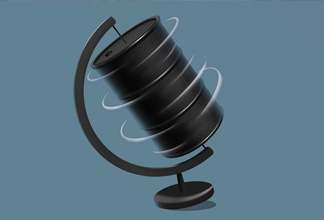How Long Does it Really Take to Form a New Habit?
Written by Sylvia Stewart
Published on May 13, 2019
minute read
Share:
Whether it's guzzling eight glasses of water a day, finally quitting smoking or breaking a bad investment pattern that's not working for you, forming a new habit — and, more importantly, actually keeping it — takes time. But how much time, exactly? Well, that's where opinions differ. Read on to find out more about some of the popular beliefs when it comes to honing new habits.
Five Seconds (For Real!)
One of the most popular TEDx talks (17.5 million views and counting!) is life coach Mel Robbins' "How to stop screwing yourself over." In it, she shares the 5-Second Rule. According to Robbins, we spend 40 per cent of our day on "autopilot," operating out of habit. "If you have an instinct to act on a goal, you must physically move within five seconds or your brain will kill it." Learn to grab onto that feeling rather than push your new habit to the furthest corner of your brain.
Making an investment decision in five seconds without doing your due diligence may not be the best tactic, but there are many investing-related habits that are easy to act on quickly. For example, setting up a pre-authorized contribution (PAC) plan lets you pay yourself first by directing money to your savings and investments automatically. Boom! An instant new savings habit.
Three Days
An old adage says it takes three days to break a habit. Whatever the time period, your chances of success will be much better if you start a new habit at the same time, says Pulitzer Prize-winning reporter Charles Duhigg in The Power of Habit: Why We Do What We Do in Life and Business. Once you've replaced an old practice (maybe your tendency to invest impulsively) with a new behaviour (ask yourself if an investment is right for you first and do some research), repeat it three times in a row to make it your new norm.
21 Days
For five decades following the 1960 publication of the uber-popular pop psychology book Psycho-Cybernetics, conventional wisdom maintained that the magic number of days to change a behaviour was 21. According to author and plastic surgeon Dr. Maxwell Maltz, that's at least how long it took for his patients to get used to their new looks. Pop psychologists hopped aboard this easy three-week idea, but modern thinkers know that overhauling habits is not so cut and dried.
Rather than focus on a certain length of time, business coach Tom Bartow says that habit formation has three phases: The Honeymoon, The Fight Thru and Second Nature. In the first phase, we feel inspired, and change even feels easy. Then reality sets in, and we struggle to stay the course. Eventually, if we stick it out, the new habit starts to feel like second nature. At some point, we may find ourselves back in phase two, but we can "fight thru" it again, he says.
66 Days (a.k.a. Slow and Steady Wins the Race)
Though overhauling a habit in just a few days (or right now!) sounds efficient, most of us know deep down that changing behaviour takes much more time. A more realistic goal, according to a study published in the European Journal of Social Psychology, is about two months — and the more complex the behaviour, the longer it takes. How does the saying go? Good things come to those who...work hard?
Of course there are many who are less patient, as in...
Zero Days, a.k.a. Cold Turkey
Before forming a new habit, you often want to break an old one — which, like yanking off a Band-Aid, is sometimes best done fast. Quitting cold turkey can be surprisingly effective, with one major caveat: you have to really want it. In a study about smoking cessation, published in Annals of Internal Medicine in 2016, participants were divided into two groups: abrupt quitters and gradual quitters. After a month, almost half of the abrupt quitters were still smoke-free, whereas only 39.2 per cent of gradual quitters managed to resist lighting up.
What's interesting is that within the abrupt quitter group, those who preferred the abrupt route before the study began — that is, people who seemed especially motivated — were more successful: 58 per cent were smoke-free after a month, compared to 42 per cent of abrupt quitters who would've preferred the gradual route.
Whatever approach you take, don't give up too soon. You may experience four distinct humps: the hard part (i.e., stop doing that!), soul searching (why do you procrastinate, huh?), almost there (it's starting to feel like second nature, but don't let that fool you) and finally the end game (you did it!). Then you can sit back and reap the rewards of your new habit — you deserve it!
RBC Direct Investing Inc. and Royal Bank of Canada are separate corporate entities which are affiliated. RBC Direct Investing Inc. is a wholly owned subsidiary of Royal Bank of Canada and is a Member of the Investment Industry Regulatory Organization of Canada and the Canadian Investor Protection Fund. Royal Bank of Canada and certain of its issuers are related to RBC Direct Investing Inc. RBC Direct Investing Inc. does not provide investment advice or recommendations regarding the purchase or sale of any securities. Investors are responsible for their own investment decisions. RBC Direct Investing is a business name used by RBC Direct Investing Inc. ® / ™ Trademark(s) of Royal Bank of Canada. RBC and Royal Bank are registered trademarks of Royal Bank of Canada. Used under licence. © Royal Bank of Canada 2019. All rights reserved.
The views and opinions expressed in this publication are for your general interest and do not necessarily reflect the views and opinions of RBC Direct Investing. Furthermore, the products, services and securities referred to in this publication are only available in Canada and other jurisdictions where they may be legally offered for sale. If you are not currently resident of Canada, you should not access the information available on the RBC Direct Investing website.
Explore More

The Hidden Costs of Being Single
How single Canadians can build wealth on their own terms
minute read

What Investors Can Learn from Hockey Star and RBC Olympian Sarah Nurse
Nurse's path to the podium reveals how preparation, planning and practice can turn potential into a golden opportunity
minute read

Crude Questions? A Look at Canada’s Oil Economy
What you need to know about Canada’s oil industry
minute read
Inspired Investor brings you personal stories, timely information and expert insights to empower your investment decisions. Visit About Us to find out more.







